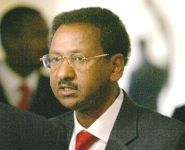Sudan says in full control of troubled Darfur
By Opheera McDoom
KHARTOUM, Oct 25 (Reuters) – Sudan said on Monday it was in full control in Darfur, despite recent rebel attempts to occupy villages and towns in the western region and reports that a shaky truce is crumbling.
 Foreign Minister Mustafa Osman Ismail warned that if the rebels continued, tribes could form militias to fight them off, sparking a return to the sort of fierce fighting seen previously during the 20-month-old rebellion, in which more than 1.5 million people have been forced from their homes.
Foreign Minister Mustafa Osman Ismail warned that if the rebels continued, tribes could form militias to fight them off, sparking a return to the sort of fierce fighting seen previously during the 20-month-old rebellion, in which more than 1.5 million people have been forced from their homes.
“We are in full control. Yes there are some violations here and there but the government is in control,” he told reporters, as peace talks began in the Nigerian capital Abuja.
The United Nations said last week a ceasefire, signed in April between rebels and the government, was not holding.
“The government’s position is that the operations that are going on in Darfur are in self-defence. The government cannot stand by and wait for the rebels to attack and occupy villages and cities, which is against the ceasefire,” Ismail said.
“If the government allows the rebels to occupy the villages and towns this will lead to the tribes in those villages to take up arms and militias to face these operations by the rebels.”
Ismail blamed the rebels for most of the attacks and said they were trying to regain as much territory as possible before the signing of any security arrangements in Abuja.
The United Nations says the fighting has sparked one of the world’s worst humanitarian crises and it has threatened Sudan with sanctions if it fails to stop the violence.
The United States has described the death toll as genocide.
U.N. estimates, disputed by Sudan, place the number of dead from malnutrition and disease at about 70,000 since March. There are no reliable estimates of numbers killed by the fighting.
After years of skirmishes between Arab nomads and mostly non-Arab farmers over scarce resources, rebels took up arms early last year accusing Khartoum of neglect and of using Arab militias known as Janjaweed to loot and burn non-Arab villages.
Khartoum admits arming some militias to fight the rebels but denies any links to the Janjaweed, calling them outlaws.
Both the European Union and the U.N. special envoy Jan Pronk have expressed concern over the state of the truce in Darfur.
Two new rebel factions have emerged, which African Union and U.N. officials have said threaten to complicate peace efforts. The National Movement for Reform and Development, which has emerged from the rebel Justice and Equality Movement, does not recognise the April truce.
